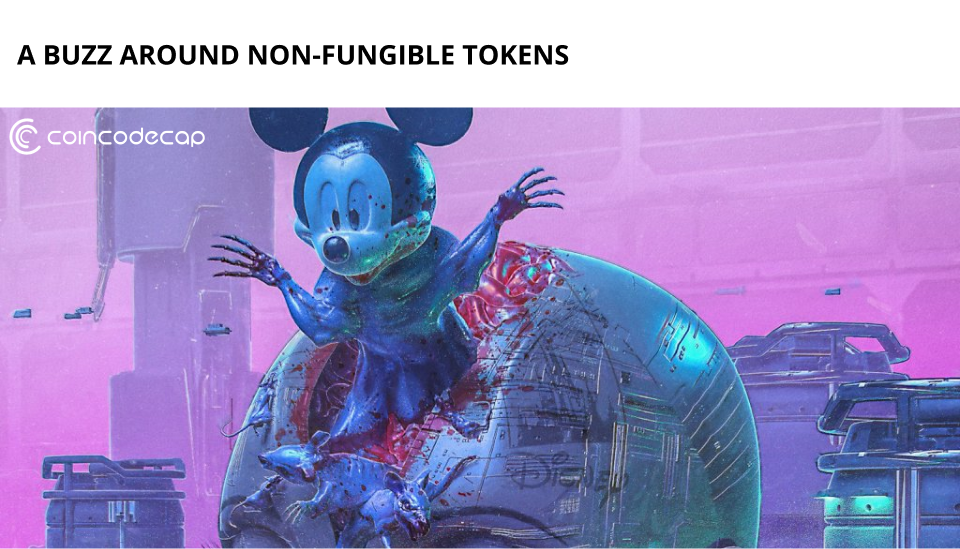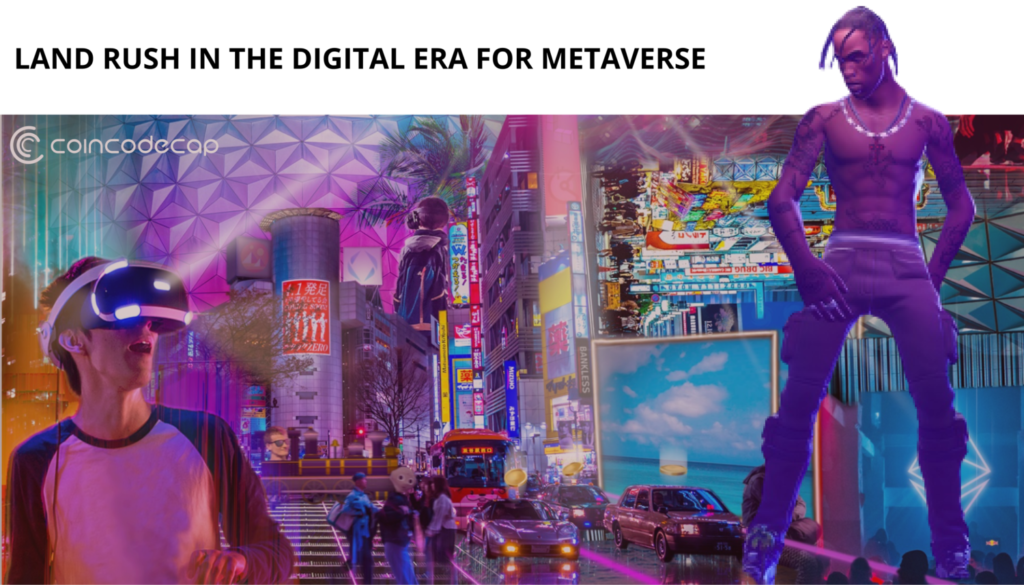Table of Contents
Key Takeaways:
- NFTs are set to be the next big game changer as they can affect a wide range of businesses. Any industry that benefits from digitalization might be a good candidate for employing NFTs to convey rights transfers. Further, this article would be aiming to cover all the buzz around Non-Fungible Tokens.
- New revenue sources, the opportunity to possess a one-of-a-kind digital work that cannot be changed, deleted, or replaced, and the capacity to monitor ownership and provenance of highly desired artifacts are all possible with NFTs.
- Furthermore, the smart contracts embedded into NFTs enable automatic sales and resales and assist producers in maintaining and receiving proper royalties.
NFTs are digital tokens that may be used to indicate ownership of one-of-a-kind goods. They enable us to tokenize items such as artwork, valuables, and even real estate. They can only have one official owner at a time, and they’re protected by the Ethereum blockchain, which means no one can change the ownership record or create a new NFT. “Non-fungible” basically indicates it’s one-of-a-kind and can’t be substituted with anything else. A bitcoin, for example, is fungible, meaning you can exchange one for another and get precisely the identical item. (For instance, ETH and dollars are fungible because one ETH / $1 may be exchanged for another ETH / $1) A one-of-a-kind trading card, on the other hand, is non-transferable.
How do NFTs work?
NFTs vary from ERC-20 tokens such as DAI and LINK in that each token is unique and cannot be divided. NFTs allow for the assignment or claim of ownership of any unique piece of digital data, which can be tracked using Ethereum’s blockchain as a public ledger. As a representation of digital or non-digital assets, an NFT is created from digital items. The individual who owns the file retains possession of it indefinitely, making it almost hard to duplicate the original’s attributes. When you sell an NFT, you are providing the buyer with all ownership and rights.

Why are NFTs important?
There are several buyers for NFTs, just as there are for paintings, sculptures, and other kinds of art. For example, an NFT by Beeple, a digital artist, was sold for $69 million. NFTs are seen as the future of ownership by enthusiasts. They predict that all types of property, from event tickets to houses, will be tokenized in this fashion at some point.
NFTs have the potential to answer the challenge of how to monetize digital artworks for artists. They can earn more money from NFTs since they can receive a royalty each time the NFT is sold after the original transaction.
NFTs to digital artwork by Grimes, better known as Elon Musk’s former partner, was purchased for roughly $6 million. In addition, someone reportedly pitched Jack Dorsey, Twitter’s co-founder, and CEO, $2.5 million for an NFT to the first-ever tweet.
Celebrities and organizations have started to use the technology, pushing it into the mainstream. Paris Hilton’s NFT collection was revealed, with some pieces already selling for $1 million and another set to begin bidding at the same price. In addition, top Shot NFTs are on sale in the NBA, Kings of Leon are sending their NFT to space, and a 12-year-old youngster sold his collection for $400,000.
NFT fever and its impact on different industries:
Art and Gaming Industry
NFTs are widely used in the art, gaming, and digital collectibles industries. Artists have discovered a market prepared to invest in one-of-a-kind digital artworks, not just for the paintings themselves but also for the possible future appreciation of the underlying NFT.
Beeple’s animated digital image HUMAN ONE (2021) and NFT, shown in a 3D digital lightbox composed of four LED panels, recently sold for little under US $29 million, including buyers’ costs.
NFT gamification incorporates blockchain technology with features such as competition, point-scoring, and game mechanics. GameFi, a platform for trading and swapping game assets for monetary incentives, was born due to this integration. For instance, each creature (called an Axie) in the game Axie Infinity is created as an NFT. In return for crypto prizes, Axie gamers can fight with their NFTs.
Metaverse
The Metaverse is a virtual world that integrates social networking, online gaming, augmented reality (AR), virtual reality (VR), and cryptocurrency to allow people to connect digitally. As metaverse expands, it will develop platforms that enable more multidimensional user interactions than present technology allows. As a result, users in the metaverse will be able to immerse themselves in an environment where the digital and physical worlds collide, rather than only watching digital content.

Fashion and couture
The fashion business, in addition to digital creative works, has penetrated the virtual world. For example, NFT, a technology that permits digital recording content, may sell Avatar apparel and shoes.
The “encrypted fashion” was first discovered on the virtual reality site Decentraland, but it has since grabbed the attention of brands like Louis Vuitton, Burberry, and Gucci.
As a result, NFTs have quickly become ingrained in consumer behavior. Recently, the MORPHEW Genesis NFT Collection, where consumers can purchase physical and digital fashion items and receive one-of-a-kind certificates of ownership, adding a level of exclusivity that has always appealed to collectors, grabbed a lot of attention.
The MORPHEW Genesis NFT Collection garments will be auctioned on the Openseas platform starting Tuesday, November 30 at 7 p.m. EST during MORPHEW Miami’s Faena Bazaar. The successful bidder will receive both the authentic clothing and the digitally preserved asset from NFT.
Real Estate Industry
Physical land or property can be represented on a blockchain as an NFT in the real estate business. This means that a digital token representing a piece of land might have various properties, such as location, price, and dimensions. Furthermore, NFTs allow for fractal ownership of Real Estate and Metaverse assets.
Upland has received $18 million for its non-fungible token (NFT) virtual real estate game, similar to a real-world version of Monopoly, with a valuation of $300 million. It overlays virtual digital ownership on the actual world, allowing you to own your home in both the physical and virtual worlds. Even better, you could virtually hold San Francisco City Hall.
Media and Entertainment Industry
It was first noticed in March when Legendary Entertainment collaborated with Boss Logic and Terra Virtua Ltd to develop two new unique NFT collections. Their purpose was to market NFTs based on Godzilla vs. Kong. In addition, limited-edition collector NFTs depicting the two monsters battling were made available. It felt revolutionary as a source of revenue, but it was just getting started.
In June, Enderby Entertainment, a multinational production company, teamed up with CurrencyWorks to create Vuele, the world’s first full-length feature film NFT watching and distribution platform. The first NFT auctioned off by Vuele was Zero Contact, a science-fiction movie starring Anthony Hopkins.
Another element of the utilization of NFTs that the movie industry may benefit from is funding. For example, Rarible recently sponsored an NFT sale by award-winning director Michael Beets to raise funds for the world’s first documentary produced entirely by refugees from all over the world.
Exchanges
Apart from dedicated NFT marketplaces, exchanges have been setting up there own NFT marketplace lately. Further, fuleing the already competitive market in the NFT world. Further, recently Coinbase announced its own NFT platform, that’ll soon allow you to buy, sell, and trade digital collectibles.
Overall, it’s clear that NFTs have a lot of potentials, not just in the world of fine art but also in the media-film industries, fashion, real estate, and any other growing sector that could monetize on tokenization.









